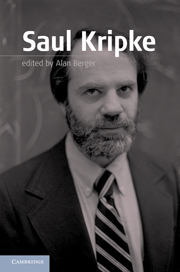Book contents
- Frontmatter
- Contents
- List of Contributors
- Introduction to Kripke
- Part I Naming, Necessity, and Apriority
- 1 Kripke on Proper and General Names
- 2 Fiction, Myth, and Reality
- 3 Kripke on Epistemic and Metaphysical Possibility
- 4 Possible Worlds Semantics
- Part II Formal Semantics, Truth, Philosophy of Mathematics, and Philosophy of Logic
- Part III Language and Mind
- Part IV Philosophy of Mind and Philosophical Psychology
- Index
- References
2 - Fiction, Myth, and Reality
Published online by Cambridge University Press: 05 June 2012
- Frontmatter
- Contents
- List of Contributors
- Introduction to Kripke
- Part I Naming, Necessity, and Apriority
- 1 Kripke on Proper and General Names
- 2 Fiction, Myth, and Reality
- 3 Kripke on Epistemic and Metaphysical Possibility
- 4 Possible Worlds Semantics
- Part II Formal Semantics, Truth, Philosophy of Mathematics, and Philosophy of Logic
- Part III Language and Mind
- Part IV Philosophy of Mind and Philosophical Psychology
- Index
- References
Summary
Among the most difficult, and perennial, of philosophical problems are those arising from sentences involving nondesignating names. Chief among these problems is that of true singular negative existentials. Negative existentials naturally arise in separating fact from fiction and in debunking mistaken theories. Consider, for example,
(~1) Sherlock Holmes is nonexistent
interpreted not as an assertion within the Sherlock Holmes canon but as an assertion about reality. So interpreted, the sentence is evidently true. It seems as if (~1) designates someone (by its subject term) in order to say (by its predicate) that he does not exist. But it also entails that there is no such thing to be designated. How can any sentence with a nondesignating term in subject position be true? I call a mistaken theory that has been believed a myth. Myth-smashing sentences like ‘Santa Claus isn’t real’ and ‘There’s no such intra-Mercurial planet as Vulcan’ give rise to the same philosophical conundrum as (~1). G. E. Moore put the problem as follows:
[I]t seems as if purely imaginary things, even though they be absolutely contradictory like a round square, must still have some kind of being – must still be in a sense – simply because we can think and talk about them…. And now in saying that there is no such thing as a round square, I seem to imply that there is such a thing. It seems as if there must be such a thing, merely in order that it may have the property of not-being. It seems, therefore, that to say of anything whatever that we can mention that it absolutely is not, were to contradict ourselves: as if everything we can mention must be, must have some kind of being. (Some Main Problems of Philosophy, London: George Allen & Unwin, 1953, at p. 289)
- Type
- Chapter
- Information
- Saul Kripke , pp. 49 - 77Publisher: Cambridge University PressPrint publication year: 2011
References
- 2
- Cited by

